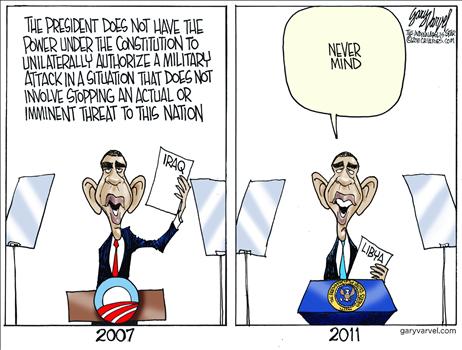
“The Congress shall have Power . . . To declare War.” – U.S. Constitution, Article I, Section 8
A bit of a constitutional showdown is shaping up over the Libyan War. A couple weeks ago, the U.S. Congress passed a resolution demanding that Mr. Obama comply with the Wars Powers Act and seek congressional authorization for continuing the war by today (June 17). The Obama administration has failed to do so. The 1973 War Powers Act (WPA) states that, unless the USA is attacked directly, the president must seek congressional approval within sixty days of committing U.S. military forces into combat actions. Obama began attacks on Libya on March 19, which means that he will be in open violation of the WPA this Sunday if he does not get authorization today (the last business day before the deadline).
Boehner’s resolution purposely attempted to give the Obama administration more time in hopes that they would try to get congressional approval, as opposed to Kucinich’s resolution, which called for a full withdrawal within fifteen days, or else funds would be completely cut off for the Libyan war. However, Obama has not used this extra leeway, continuing to insist that he does not need to get authorization. Every president since the WPA was passed has denied that it is legitimate, but they have all voluntarily opted to follow it anyway.1 Of course, it is legitimate, and in fact it could well be argued that it still gives the president too much power. But since every president post-1973 has been a power-hungry, big-government statist, it is understandable that they did not want any restraints on their actions. Obama, on the other hand, has to admit that the WPA is legitimate, since he has repeatedly used it in the past (rightly) to attack President Bush’s wars. However, Obama is saying that the WPA does not apply in this case, because the the conflict is not big enough. Say what? The Oxford Dictionary defines war as “a state of armed conflict between different nations or states or different groups within a nation or state.”2 What we are doing in Libya most certainly is a war, and its size is irrelevant to the fact that only Congress can declare a war. This is just another flagrant violation of the U.S. Constitution by Mr. Obama.
With support building both in Congress and in the general public for a non-interventionist foreign policy, it is quite possible that a Kucinich-type resolution could pass Congress and forcibly end America’s involvement in Libya. If this happens and the U.S. leaves the rest of NATO holding the bag for the ill-advised Libya adventure, then NATO could very well pull its support from the war in Afghanistan.3 This in turn could led to a breakup of NATO. The U.S. is already fighting wars in Iraq, Afghanistan, Pakistan, Libya, and Yemen; let us hope that this does happen and that this can be used to crash the imperial projects before the out-of-control Executive Branch can launch any more wars. Considering that NATO has served no positive purpose since the fall of the USSR and has served only has an enabler for the globalist elites, breaking up NATO too would be the cherry on top.
As Pat Buchanan says in a recent article concerning the future of NATO and U.S. imperialism,
“Yankee, go home!” much of the world has been yelping for years. We may be all about to find out what happens when the Yankees do go home, not to return again for a long, long time.
Footnotes
| Tweet |
|
|
|




